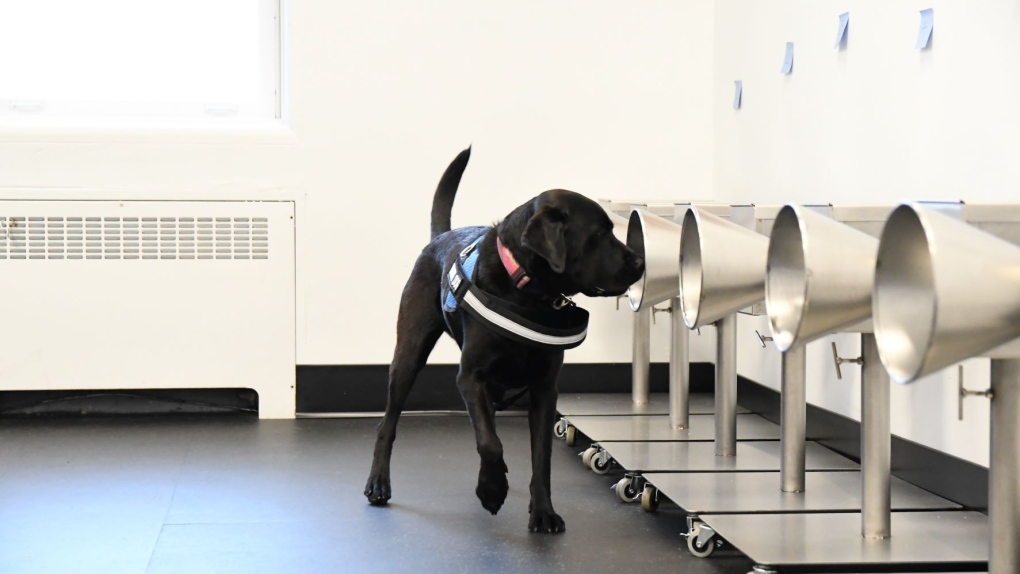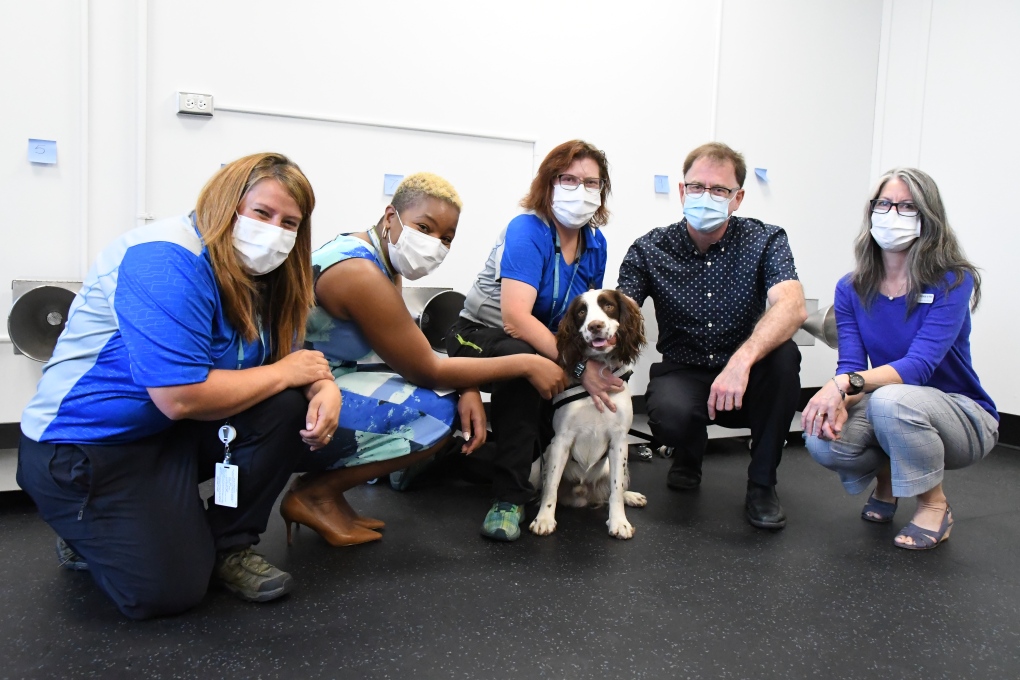Vancouver-area health officials train dog team to sniff out COVID-19
A health authority with a history of using dogs to help detect medical conditions has found a way to use its canine scent detection team to sniff out COVID-19.
Vancouver Coastal Health (VCH) has trained its team, called Canines for Care, to signal the scent of the disease.
The B.C. health authority said it was "no small feat" to train a team of dogs already able to detect the bacteria Clostridium difficile, also known as C. difficile, to notice a relatively new type of infection.
“We’re happy to say they have a sensitivity of 100 per cent…and that’s amazing,” said VCH medical microbiologist Dr. Marthe Charles, noting that means the dogs never miss a positive sample.
“They’re super brilliant, they’re driven, and they are accurate,” Charles added.
The process took the experienced team about six months to figure out.
Even finding the right dogs – two Labrador retrievers and one English springer spaniel – required a global approach.
VCH said the team, which is partly funded by Health Canada's restart program, worked with others around the world to find dogs with the right combination of genetics and potential.
"Every dog can sniff, but not every dog can work," canine scent detection specialist Teresa Zurberg said.
And once the dogs, named Micro, Yoki and Finn, were selected, the team had to figure out how to get access to samples, and train the canines in a way that was safe for the pups and their handlers.
Charles said the team collected saliva, breath and sweat samples from consenting patients.
Those samples were prepared in a way that removed the risk of transmission of the active virus.
Zurberg demonstrated for CTV News how the spaniel, Finn, zeroed in, in a room full of a dozen small “scent stands” which look like small cone-shaped speakers, on the stand containing the positive COVID-19 sample.
When she took the dog out of the room, and changed the position of the positive sample, Finn still found it within a matter of a few seconds.
“Odor to the dog is like colour is to us,” Zurberg said. “Where we can see different colours and shades and intensities, that’s how scent works for these guys.”
Each time Finn found the positive sample, Zurberg shouted “Good boy!” and released a treat from a small dispensing machine.
“This whole smelling thing, the sniffing thing, whether it’s a bomb dog, a drug dog, or a covid dog, it’s all a game,” she said.
In August, Micro, Yoki and Finn all passed what VCH describes as a "rigorous validation process" from a third party.
 (Vancouver Coastal Health)
(Vancouver Coastal Health)
According to VCH, the dog team is part of its strategy to "tackle COVID-19 prevention from every possible angle."
“I think it’s really exciting to see that we can add another tool to the toolbox,” said Charles.
The health authority was the first in the world to operationalize its C. difficile detecting dog program, and now plans to develop a dog training program to provide ongoing public health support.
Possible future applications of teams like the one at VCH include detection of COVID-19 at airports and on cruise ships.
 (Vancouver Coastal Health)
(Vancouver Coastal Health)
CTVNews.ca Top Stories

LIVE UPDATES 'He is no hero': Pennsylvania authorities announce charges against Luigi Mangione
Following his arrest in Altoona, Pa. earlier on Monday, Luigi Mangione was arraigned and charged with five counts, according to a criminal complaint.
Union reportedly drops wage demands in Canada Post negotiations
The Canadian Union of Postal Workers (CUPW) has reportedly dropped its wage demand to 19 per cent over four years, CTV News has learned.
Sudbury, Ont., family traumatized after hospital said loved one had been released, when in fact they had passed away
Sudbury resident Angela Vitiello says a staff member at Health Sciences North told her that her brother, Allan St. Martin, was released from the hospital late last month when, in fact, he had passed away.
CN Rail, Unifor reach tentative deal ahead of potential strike
Canadian National Railway confirms it reached a tentative agreement with the union representing nearly 3,300 employees working in “mechanical, clerical, and intermodal functions,” likely preventing potential job action.
Liberal government survives third Conservative non-confidence vote
Conservative Leader Pierre Poilievre's latest attempt to topple the minority Liberal government in a non-confidence vote failed on Monday, thanks to the New Democrats.
Polygamous U.S. sect leader gets 50 years in prison in scheme to orchestrate sex involving children
A polygamist religious leader in the U.S. who claimed more than 20 spiritual “wives” including 10 underage girls was sentenced to 50 years in prison on Monday.
Montreal man retiring early after winning half of the $80 million Lotto-Max jackpot
Factor worker Jean Lamontagne, 63, will retire earlier than planned after he won $40 million on Dec. 3 in the Lotto-Max draw.
Katie Holmes refutes story about daughter Suri Cruise’s fortune
Katie Holmes has posted a screen grab of a Daily Mail article, which reported that her 18-year old daughter, whose father is Tom Cruise, is now a "millionaire."
Trudeau says dealing with Trump will be 'a little more challenging' than last time
Prime Minister Justin Trudeau said dealing with incoming president Donald Trump and his thundering on trade will be 'a little more challenging' than the last time.

































